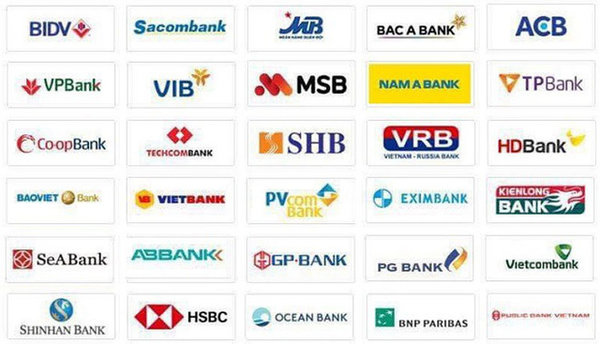Vietnam’s banking sector becomes more attractive to investors
Growing attractiveness of Vietnamese banks' shares is thanks to a positive revamp and strong outlook of the sector, particularly as Vietnam is accelerating global economic integration.
Billions of USD is being poured into the Vietnamese banking sector, indicating its growing attractiveness in the eyes of investors and leading to expectation that a major change is coming to one of the economy’s key fields.
| Banks with positive performance over the last two years. |
A few days ago, state-run Commercial Bank for Investment and Development of Vietnam (BIDV) announced South Korea’s KEB Hana Bank as its first foreign strategic shareholder after the latter closed a deal worth VND20.3 trillion (US$875 million) to buy a 15% stake of of BIDV, making this the biggest M&A deal in Vietnam’s banking industry.
The deal helped boost BIDV’s charter capital to over VND40.2 trillion (US$1.7 billion), the highest amount among banks operating in Vietnam
A partnership between BIDV and KEB Hana Bank continues a positive trend of the foreign capital pouring into Vietnamese banks over the last two years, marking a significant trend after nearly a decade of Vietnamese banks struggling with bad debts.
Since 2017, the sector has witnessed a growing number of Vietnamese banks selling stakes to foreign investors, such as Vietnam Prosperity Joint Stock Commercial Bank (VPBank), Ho Chi Minh City Development JSC Bank (HDBank), and Tien Phong Commercial Joint Stock Bank (TPBank).
HDBank sold a 21.5% stake to 76 foreign investors, including major financial institutions as Deutsche Bank, JP Morgan, Dragon Capital, Credit Saison, bagging VND6.8 trillion (US$300 million).
Meanwhile, investment fund PYN Fund Management acquired a 4.99% stake of TPBank for nearly US$40 million.
In mid 2017, VPBank revealed 80 foreign investors that had registered to purchase the lender’s stake worth up to US$1.2 billion, and in early 2018, Vietnam Technological and Commercial Joint Stock Bank (Techcombank) successfully closed a deal to unload more than 164 million shares to foreign investors for a total of VND21 trillion (US$920 million) in proceeds.
Joint Stock Commercial Bank for Foreign Trade of Vietnam (Vietcombank) increased its charter capital to VDN37.1 trillion (US$1.6 billion) by selling a combined 3% stake in a private placement to Japan’s Mizuho Bank and Singapore’s sovereign wealth fund GIC in early 2019 for VND6.2 trillion (US$270 million).
Potential deals
According to Reuters, Vietnam’s Military Commercial Bank (MB Bank) is seeking to sell a 7.5% stake to one or more foreign investors. At a share price of VND21,500 apiece (US$0.93), the deal is potentially around VND3.48 trillion (US$150.13 million).
Moreover, Vietcombank plans to offer a 6.5% stake to foreign investors, aiming to sell a total of 10% stake to investors following the previous sale in early 2019.
Growing attractiveness of Vietnamese banks' shares is thanks to positive transformation and strong outlook of the banking sector, particularly as Vietnam is integrating further in the global economy.
In 2017, banks started recording hefty profits and a steady decline of bad debts. Vietcombank’s pre-tax profit in the first nine months of 2019 reached VND17.6 trillion (US$760 million), while that of Agribank was VND9.7 trillion (US$418.8 million) and Techcombank's VND8.9 trillion (US$384.3 million). Statistics showed that nearly 15 banks recorded profit of over US$40 million each.
Share rally
Following the partnership with KEB Hana Bank, BIDV’s stock increased 45% in value since the beginning of the year to date at VND42,000 (US$1.81) apiece, coming close to its peak of VND44,000 (US$1.90) recorded in early 2018.
Vietcombank’s shares also witnessed a surge of 45% in value to date to a record high of VND92,000 (US$3.97), much higher than the figure of VND56,000 (US$2.42) previously sold to foreign investors.
With greater financial capabilities and growing sizes, as well as high GDP growth rate and stable macro-economic conditions, Vietnamese banks will have more opportunities to grow if they can qualify for requirements on capital adequacy ratio (CAR) following Basel II standards.
Recently, banks also recorded strong growth thanks to retail banking and financial services. For example, Vietcombank signed a contract worth US$400 million with FWD Insurance to become the official distributor of latter’s life insurance services in Vietnam.













